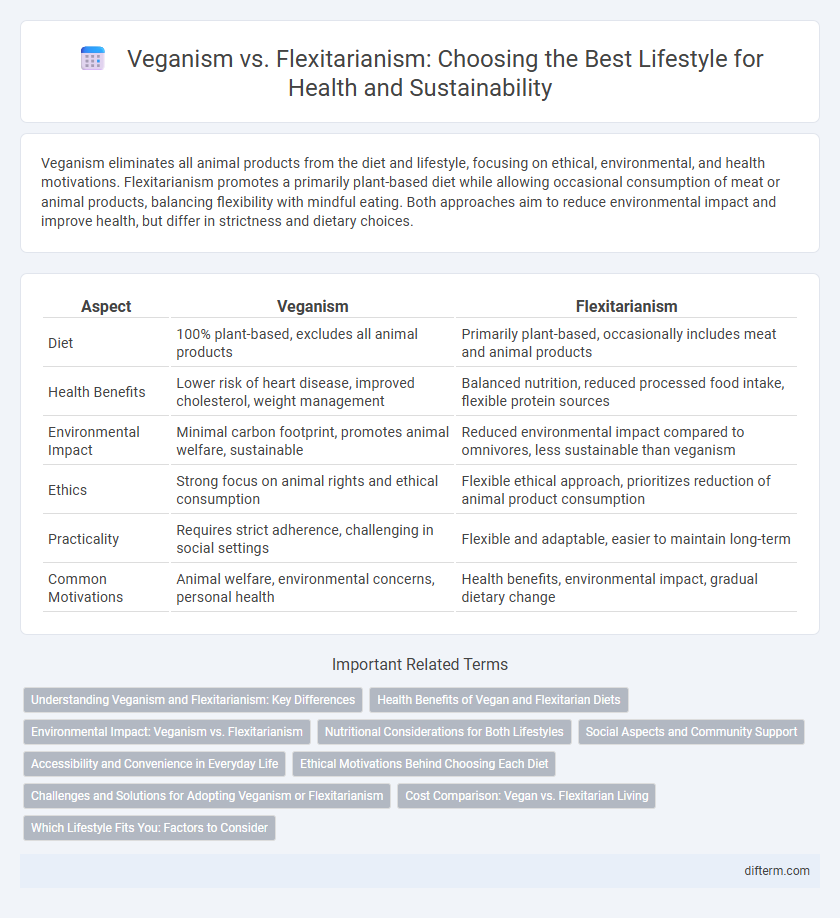Veganism eliminates all animal products from the diet and lifestyle, focusing on ethical, environmental, and health motivations. Flexitarianism promotes a primarily plant-based diet while allowing occasional consumption of meat or animal products, balancing flexibility with mindful eating. Both approaches aim to reduce environmental impact and improve health, but differ in strictness and dietary choices.
Table of Comparison
| Aspect | Veganism | Flexitarianism |
|---|---|---|
| Diet | 100% plant-based, excludes all animal products | Primarily plant-based, occasionally includes meat and animal products |
| Health Benefits | Lower risk of heart disease, improved cholesterol, weight management | Balanced nutrition, reduced processed food intake, flexible protein sources |
| Environmental Impact | Minimal carbon footprint, promotes animal welfare, sustainable | Reduced environmental impact compared to omnivores, less sustainable than veganism |
| Ethics | Strong focus on animal rights and ethical consumption | Flexible ethical approach, prioritizes reduction of animal product consumption |
| Practicality | Requires strict adherence, challenging in social settings | Flexible and adaptable, easier to maintain long-term |
| Common Motivations | Animal welfare, environmental concerns, personal health | Health benefits, environmental impact, gradual dietary change |
Understanding Veganism and Flexitarianism: Key Differences
Veganism strictly excludes all animal products for ethical, environmental, or health reasons, emphasizing plant-based foods and lifestyle choices. Flexitarianism promotes a primarily plant-based diet while allowing occasional consumption of meat and animal products, focusing on flexibility and sustainability. Understanding these key differences helps individuals make informed dietary decisions aligned with their values and health goals.
Health Benefits of Vegan and Flexitarian Diets
Vegan and flexitarian diets both emphasize plant-based foods rich in fiber, antioxidants, and essential nutrients that support cardiovascular health and reduce inflammation. Vegan diets eliminate all animal products, often leading to lower cholesterol levels and decreased risk of chronic diseases like type 2 diabetes, while flexitarian diets allow occasional meat consumption, providing a more balanced intake of protein and micronutrients. Research indicates both dietary patterns contribute to weight management, improved gut health, and enhanced metabolic function, promoting overall wellness.
Environmental Impact: Veganism vs. Flexitarianism
Veganism significantly reduces greenhouse gas emissions, land use, and water consumption compared to flexitarian diets by eliminating all animal products. Flexitarianism lowers environmental impact relative to traditional omnivorous diets by incorporating more plant-based meals and reducing meat intake. Choosing veganism offers the most substantial environmental benefits, while flexitarianism provides a more moderate but still impactful approach to sustainability.
Nutritional Considerations for Both Lifestyles
Veganism eliminates all animal products, requiring careful attention to nutrients like vitamin B12, iron, calcium, omega-3 fatty acids, and complete proteins to avoid deficiencies. Flexitarianism allows occasional animal-based foods, offering more dietary flexibility and easier access to essential nutrients while still emphasizing plant-based meals for health benefits. Both lifestyles benefit from varied whole foods and possible supplementation to meet individual nutritional needs and maintain balanced diets.
Social Aspects and Community Support
Veganism fosters a strong, tight-knit community centered around shared ethical beliefs and environmental activism, creating supportive networks through events, forums, and social media groups. Flexitarianism appeals to a broader audience by promoting flexible dietary choices, which can facilitate social integration and reduce the feeling of dietary isolation during communal meals or gatherings. Both lifestyles leverage community support to encourage sustainable habits, but veganism's strict commitment often leads to more organized advocacy and resource sharing.
Accessibility and Convenience in Everyday Life
Veganism offers a plant-based lifestyle with growing availability of diverse products in supermarkets and restaurants, making it increasingly accessible. Flexitarianism provides greater convenience by allowing occasional inclusion of animal products, easing dietary transitions and social situations. Both approaches benefit from expanding market options, but flexitarianism typically requires less strict planning for everyday meals.
Ethical Motivations Behind Choosing Each Diet
Veganism is driven by a strong ethical commitment to animal rights, aiming to eliminate all forms of animal exploitation and suffering by avoiding all animal products. In contrast, flexitarianism reflects a more flexible ethical stance that balances a reduction in animal consumption with practical dietary choices, often motivated by environmental concerns and health benefits alongside animal welfare. Both diets emphasize ethical considerations but differ in the extent and strictness of their commitment to animal welfare.
Challenges and Solutions for Adopting Veganism or Flexitarianism
Adopting veganism or flexitarianism presents challenges such as nutritional deficiencies, social pressures, and limited food options, especially in traditional diets. Solutions include education on balanced meal planning, incorporating plant-based protein sources like legumes and tofu, and leveraging community support groups or apps to find recipes and dining options. Gradual transitions and flexible approaches help individuals sustain dietary changes while minimizing lifestyle disruptions.
Cost Comparison: Vegan vs. Flexitarian Living
Vegan living often involves lower grocery costs due to reliance on plant-based staples like grains, beans, and seasonal vegetables, which are generally affordable and widely available. Flexitarian diets may include meat and dairy products, leading to higher expenses from purchasing animal-based items that tend to be more costly than plant-based alternatives. Meal planning and bulk buying strategies can significantly influence the overall cost efficiency of both vegan and flexitarian lifestyles.
Which Lifestyle Fits You: Factors to Consider
Choosing between veganism and flexitarianism depends on personal health goals, ethical values, and environmental impact awareness. Veganism emphasizes complete avoidance of animal products for ethical, environmental, or health reasons, while flexitarianism allows occasional consumption of meat, promoting flexibility and gradual dietary changes. Assessing factors like nutritional needs, social adaptability, and long-term sustainability helps determine which lifestyle best aligns with individual preferences and commitments.
veganism vs flexitarianism Infographic

 difterm.com
difterm.com